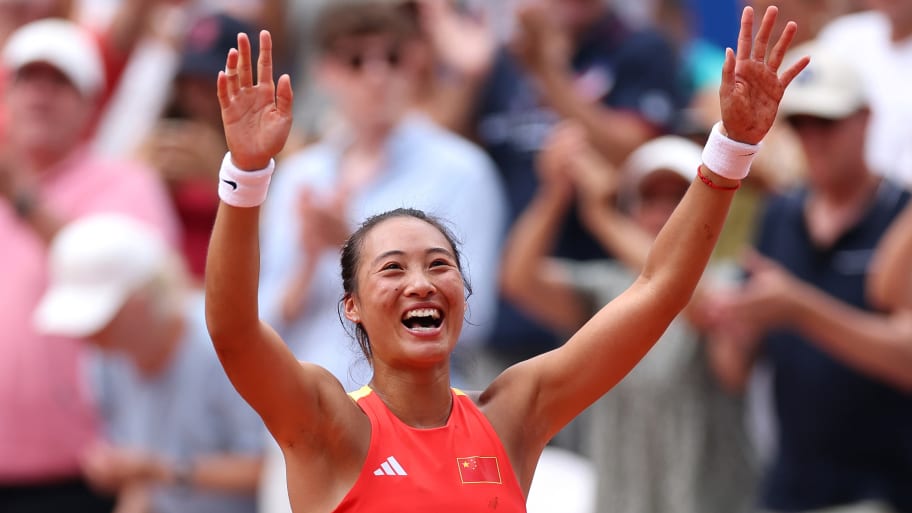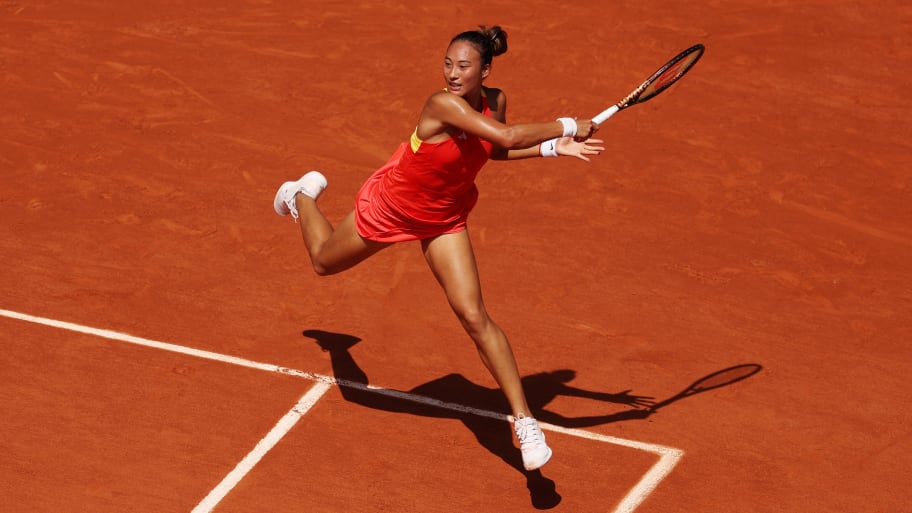
Check out Sports Illustrated’s Daily Rings, our daily Olympics podcast from Mitch Goldich and Dan Gartland. Subscribe wherever you get your podcasts (Apple,Spotify) and find clips onSI’s YouTube page.
In three appearances at the French Open, Qinwen Zheng of China announced herself and gave an amuse-bouche of her considerable skills, once reaching the fourth round. But on Saturday, she fully announced herself. Under gorgeous conditions, above the clay at Roland Garros, the 21-year-old scored the biggest win of her ascending career, taking out the Croatian veteran Donna Vekic 6–2,6–3, to take the women’s singles gold-medal match at the Paris Olympics.
Mixing her easy power with real grace on clay, Zheng played with true authority and was the better player in virtually every dimension. This was the classic case of meeting the moment. Coming as she does from a country that puts a great premium on Olympic success—and the symbolic show of national exceptionalism that comes with it—Zheng portrayed poise to match her tennis skills.
The triumph also spoke to Zheng’s ability to reset. In her first match—a bit of foreshadowing—she turned in a double bagel in a 6–0, 6–0 defeat against Italy’s Sara Errani. From there, her campaign got increasingly more difficult. In the third round, she defeated Emma Navarro of the U.S. and then deftly deflected Navarro’s vague complaints that Zheng was not a competitor worthy of respect. (“I will not consider it an attack because she lost the match,” Zheng replied. A perfect, if inadvertent, response. ) Zheng then regrouped and beat Germany’s Angelique Kerber 7–6 in the third set, thereby ending Kerber’s Hall of Fame career.
In the semifinals, she scored the upset of the tournament, if not of the year. Playing Poland’s Iga Swiatek at Roland Garros is a proposition akin to swimming against Michael Phelps. Yet Zhang took out the overwhelming favorite for gold, matching the four-time French Open champion shot for shot, and simply playing better when it mattered most.
Emboldened, not spent, from that signature win, Zheng saved her best for last. Everything about her performance on Saturday conveyed the message: I beat Swiatek in her house. There’s no way I’m not going to finish the job.

A word about Vekic: At every other WTA tournament the losing player is deemed a finalist. Here, they are called silver medalists. Especially for a player so fiercely patriotic—who stayed in the village; who spent free moments watching other Croatian athletes compete—Vekic will shake off the disappointment and take great satisfaction in her Olympic campaign.
In the third round, she scored one of the biggest wins of her career, taking out Coco Gauff, the young American who was not only seeded second but was Team USA’s flag bearer along with LeBron James. Vekic followed that up with a quarterfinal win over Marta Kostyuk—a sentimental favorite given her Ukrainian provenance—winning 10–8 in the match tiebreak, just desserts for the Wimbledon defeat. In the semifinals, no doubt motivated by the fact that overwhelming Swiatek had been eliminated, Vekic met the moment and simply outclassed her Slovakian opponent, Anna Karolína Schmiedlová. In the final, it was her turn to be outclassed. But she leaves with her head high and will look to continue her best year as a pro later this month at the U.S. Open.
Same, of course, for Zheng. A finalist at the Australian Open in January, she pierced the top 10 and became the most accomplished Chinese player since Li Na.
Zheng received no additional ranking points for this week’s triumph, but will likely be a force not only at the U.S. Open, but in the general tennis firmament over the next decade. She received no direct prize money from the Olympics—but her star wattage and off-court earning potential will likely make her a millionaire 10 times over.
Here’s what’s undeniable: Zheng will forever be known as an Olympic gold medal winner.
This article was originally published on www.si.com as Qinwen Zheng Meets the Moment at the Paris Olympics.







